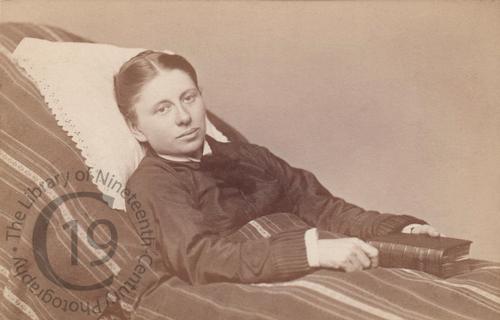
Jennie Smith, the Railroad Evangelist
A carte-de-visite portrait of Jennie Smith (1842-1924), known as ‘the Railroad Evangelist’.
Raised in the Methodist tradition in Vienna, Ohio, not far from the Pennsylvanian border, a bout of typhoid fever in her youth left her with a damaged spine which in 1862 developed into a form of paralysis. Reclining on a wheeled gurney, a cross between a daybed and a baby’s pram, she travelled the country preaching her own brand of Evangelical Protestantism. She travelled by rail but the size of her cot meant that she had to travel in the train’s baggage car, which brought her into contact with many railhands, men who often lacked the opportunity to attend regular services. When she was ‘raised from her couch of suffering’ in 1878, she renewed her ministry to the country’s rail workers and later became involved in the temperance movement. She was eventually appointed the National Superintendent of the Railroad Department of the Woman’s Christian Temperance Union. She continued travelling the railroads for many years, preaching to the railroad men and conducting meetings at stops along the route, until her death on 3 September 1924 at the age of 82. She was buried in Oakland Cemetery in Maryland.
She published several books detailing her experiences and bearing witness to her faith, most notably The Valley of Baca: A Record of Suffering and Triumph (1876), its sequel From Baca to Beulah (1880) and Ramblings in Beulah Land (2 volumes, 1881 and 1882 respectively); towards the end of her life she published Incidents and Experiences of a Railroad Evangelist (1920).
Photographed by Frederick Gutekunst of Philadelphia.
Code: 126167




